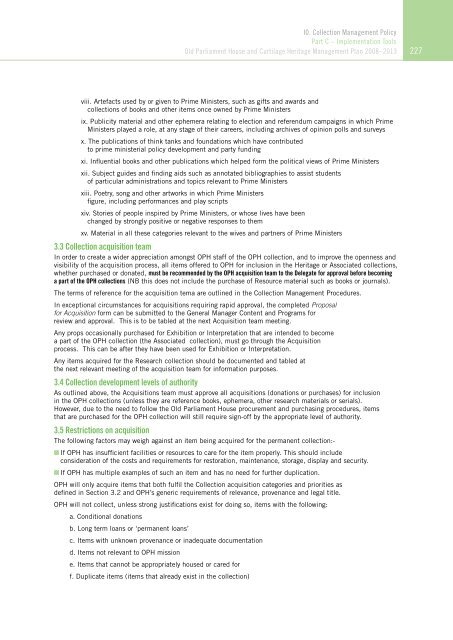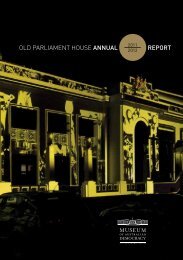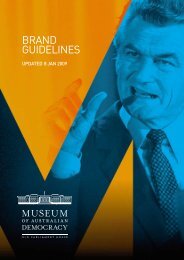- Page 1 and 2:
OLD PARLIAMENT HOUSE AND CURTILAGE
- Page 3 and 4:
OLD PARLIAMENT HOUSE AND CURTILAGE
- Page 5 and 6:
II Governing Council foreword The O
- Page 7 and 8:
IV Contents Gazettal notice I Gover
- Page 9 and 10:
VI PART C - IMPLEMENTATION TOOLS 8.
- Page 11 and 12:
VIII Old Parliament House and Curti
- Page 13 and 14:
X Old Parliament House and Curtilag
- Page 15 and 16:
XII Old Parliament House and Curtil
- Page 18:
A2 insert chapter name here Part A
- Page 21 and 22:
1. Introduction Part A - Context 2
- Page 23 and 24:
2. Description Part A - Context 4 O
- Page 25 and 26:
2. Description Part A - Context 6 O
- Page 27 and 28:
2. Description Part A - Context 8 O
- Page 29 and 30:
3. Heritage Values Part A - Context
- Page 31 and 32:
3. Heritage Values Part A - Context
- Page 33 and 34:
3. Heritage Values Part A - Context
- Page 35 and 36:
3. Heritage Values Part A - Context
- Page 37 and 38:
3. Heritage Values Part A - Context
- Page 40 and 41:
3. Heritage Values Part A - Context
- Page 42 and 43:
3. Heritage Values Part A - Context
- Page 44 and 45:
3. Heritage Values Part A - Context
- Page 46 and 47:
3. Heritage Values Part A - Context
- Page 48 and 49:
3. Heritage Values Part A - Context
- Page 50 and 51:
3. Heritage Values Part A - Context
- Page 52 and 53:
3. Heritage Values Part A - Context
- Page 54 and 55:
3. Heritage Values Part A - Context
- Page 56 and 57:
3. Heritage Values Part A - Context
- Page 58 and 59:
3. Heritage Values Part A - Context
- Page 60 and 61:
4. Management Framework Part A - Co
- Page 62 and 63:
4. Management Framework Part A - Co
- Page 64 and 65:
4. Management Framework Part A - Co
- Page 66 and 67:
Old Parliament House and Curtilage
- Page 68:
Old Parliament House and Curtilage
- Page 72 and 73:
5. Policies Part B - Management Old
- Page 74 and 75:
5. Policies Part B - Management Old
- Page 76 and 77:
5. Policies Part B - Management Old
- Page 78 and 79:
5. Policies Part B - Management Old
- Page 80 and 81:
5. Policies Part B - Management Old
- Page 82 and 83:
5. Policies Part B - Management Old
- Page 84 and 85:
5. Policies Part B - Management Old
- Page 86 and 87:
5. Policies Part B - Management Old
- Page 88 and 89:
5. Policies Part B - Management Old
- Page 90 and 91:
5. Policies Part B - Management Old
- Page 92 and 93:
5. Policies Part B - Management Old
- Page 94 and 95:
5. Policies Part B - Management Old
- Page 96 and 97:
5. Policies Part B - Management Old
- Page 98 and 99:
5. Policies Part B - Management Old
- Page 100 and 101:
6. Zones Part B - Management Old Pa
- Page 102 and 103:
6. Zones Part B - Management Old Pa
- Page 104 and 105:
6. Zones Part B - Management Old Pa
- Page 106 and 107:
6. Zones Part B - Management Old Pa
- Page 108 and 109:
6. Zones Part B - Management Old Pa
- Page 110 and 111:
6. Zones Part B - Management Old Pa
- Page 112 and 113:
7. Implementation and Review Part B
- Page 114 and 115:
7. Implementation and Review Part B
- Page 116:
7. Implementation and Review Part B
- Page 119 and 120:
8. Assessment Process Part C - Impl
- Page 121 and 122:
8. Assessment Process Part C - Impl
- Page 123 and 124:
8. Assessment Process Part C - Impl
- Page 125 and 126:
8. Assessment Process Part C - Impl
- Page 127 and 128:
8. Assessment Process Part C - Impl
- Page 130 and 131:
9. Permitted Action Schedules Part
- Page 132 and 133:
9. Maintenance Permitted Action Sch
- Page 134 and 135:
9. Maintenance Permitted Action Sch
- Page 136 and 137:
9. Maintenance Permitted Action Sch
- Page 138 and 139:
9. Maintenance Permitted Action Sch
- Page 140 and 141:
Old Parliament House and Curtilage
- Page 142 and 143:
Old Parliament House and Curtilage
- Page 144 and 145:
9. Housekeeping Permitted Action Sc
- Page 146 and 147:
9. Housekeeping Permitted Action Sc
- Page 148 and 149:
9. Housekeeping Permitted Action Sc
- Page 150 and 151:
9 Housekeeping Permitted Action Sch
- Page 152 and 153:
9. Housekeeping Permitted Action Sc
- Page 154 and 155:
9. Housekeeping Permitted Action Sc
- Page 156 and 157:
9. Housekeeping Permitted Action Sc
- Page 158 and 159:
9. Housekeeping Permitted Action Sc
- Page 160 and 161:
9. Housekeeping Permitted Action Sc
- Page 162 and 163:
9. Housekeeping Permitted Action Sc
- Page 164 and 165:
9. Building Fabric Investigation Pe
- Page 166 and 167:
9. Building Fabric Investigation Pe
- Page 168 and 169:
9. Building Fabric Investigation Pe
- Page 170 and 171:
9. Building Fabric Investigation Pe
- Page 172 and 173:
9. Building Fabric Investigation Pe
- Page 174 and 175:
9. Interpretation and Exhibition Pe
- Page 176 and 177:
9. Interpretation and Exhibition Pe
- Page 178 and 179:
9. Interpretation and Exhibition Pe
- Page 180 and 181:
9. Interpretation and Exhibition Pe
- Page 182 and 183:
9. Interpretation and Exhibition Pe
- Page 184 and 185:
9. Interpretation and Exhibition Pe
- Page 186 and 187:
9. Education Permitted Action Sched
- Page 188 and 189:
9. Education Permitted Action Sched
- Page 190 and 191:
9. Education Permitted Action Sched
- Page 192 and 193:
9. Events and Tourism Action Schedu
- Page 194 and 195:
9. Events and Tourism Permitted Act
- Page 196 and 197:
9. Events and Tourism Permitted Act
- Page 198 and 199:
9. Events and Tourism Permitted Act
- Page 200 and 201: 9. Events and Tourism Permitted Act
- Page 202 and 203: 9. Events and Tourism Permitted Act
- Page 204 and 205: 9. Events and Tourism Permitted Act
- Page 206 and 207: 9. Events and Tourism Permitted Act
- Page 208 and 209: 9. Events and Tourism Permitted Act
- Page 210 and 211: 9. Events and Tourism Permitted Act
- Page 212 and 213: 9. Events and Tourism Permitted Act
- Page 214 and 215: 9. Contractor Permitted Action Sche
- Page 216 and 217: 9. Contractor Permitted Action Sche
- Page 218 and 219: 9. Contractor Permitted Action Sche
- Page 220 and 221: 9. Contractor Permitted Action Sche
- Page 222 and 223: 9. Tenant Permitted Action Schedule
- Page 224 and 225: 9. Tenant Permitted Action Schedule
- Page 226 and 227: 9. Tenant Permitted Action Schedule
- Page 228 and 229: 9. Caterers Permitted Action Schedu
- Page 230 and 231: 9. Caterers Permitted Action Schedu
- Page 232 and 233: 9. Caterers Permitted Action Schedu
- Page 234 and 235: 9. Caterers Permitted Action Schedu
- Page 236 and 237: 9. Caterers Permitted Action Schedu
- Page 238: 9. Caterers Permitted Action Schedu
- Page 241 and 242: I0. Collection Management Policy Pa
- Page 243 and 244: I0. Collection Management Policy Pa
- Page 245 and 246: I0. Collection Management Policy Pa
- Page 247 and 248: I0. Collection Management Policy Pa
- Page 249: I0. Collection Management Policy Pa
- Page 253 and 254: I0. Collection Management Policy Pa
- Page 255 and 256: I0. Collection Management Policy Pa
- Page 257 and 258: I0. Collection Management Policy Pa
- Page 259 and 260: I0. Collection Management Policy Pa
- Page 261 and 262: I0. Collection Management Policy Pa
- Page 263 and 264: I0. Collection Management Policy Pa
- Page 266 and 267: II. Implementation Plan Part C - Im
- Page 268 and 269: II. Implementation Plan Part C - Im
- Page 270 and 271: II. Implementation Plan Part C - Im
- Page 272 and 273: II. Implementation Plan Part C - Im
- Page 274 and 275: II. Implementation Plan Part C - Im
- Page 278 and 279: D2 insert chapter name here Part D
- Page 280 and 281: A. Compliance Tables Part D - Appen
- Page 283 and 284: B. National and Commonwealth Herita
- Page 285 and 286: C. Statements of Values Part D - Ap
- Page 287 and 288: C. Statements of Values Part D - Ap
- Page 289 and 290: C. Statements of Values Part D - Ap
- Page 291 and 292: C. Statements of Values Part D - Ap
- Page 293 and 294: C. Statements of Values Part D - Ap
- Page 295 and 296: C. Statements of Values Part D - Ap
- Page 297 and 298: D. History of the Place Part D - Ap
- Page 299 and 300: D. History of the Place Part D - Ap
- Page 301 and 302:
D. History of the Place Part D - Ap
- Page 303 and 304:
D. History of the Place Part D - Ap
- Page 305 and 306:
D. History of the Place Part D - Ap
- Page 307 and 308:
D. History of the Place Part D - Ap
- Page 309 and 310:
D. History of the Place Part D - Ap
- Page 311 and 312:
D. History of the Place Part D - Ap
- Page 313 and 314:
D. History of the Place Part D - Ap
- Page 315 and 316:
D. History of the Place Part D - Ap
- Page 317 and 318:
D. History of the Place Part D - Ap
- Page 319 and 320:
D. History of the Place Part D - Ap
- Page 321 and 322:
D. History of the Place Part D - Ap
- Page 323 and 324:
D. History of the Place Part D - Ap
- Page 325 and 326:
D. History of the Place Part D - Ap
- Page 327 and 328:
D. History of the Place Part D - Ap
- Page 329 and 330:
E. ICOMOS Burra Charter Part D - Ap
- Page 331 and 332:
E. ICOMOS Burra Charter Part D - Ap
- Page 333 and 334:
E. ICOMOS Burra Charter Part D - Ap
- Page 335 and 336:
E. ICOMOS Burra Charter Part D - Ap
- Page 337 and 338:
E. ICOMOS Burra Charter Part D - Ap
- Page 339 and 340:
E. ICOMOS Burra Charter Part D - Ap
- Page 341 and 342:
F. Old Parliament House Organisatio
- Page 343 and 344:
G. G. Summary of Consultation Phase
- Page 345 and 346:
H. Risk Analysis Part D - Appendice
- Page 347 and 348:
H. Risk Analysis Part D - Appendice
- Page 349 and 350:
H. Risk Analysis Part D - Appendice
- Page 351 and 352:
H. Risk Analysis Part D - Appendice
- Page 353 and 354:
H. Risk Analysis Part D - Appendice
- Page 355 and 356:
H. Risk Analysis Part D - Appendice
- Page 357 and 358:
H. Risk Analysis Part D - Appendice
- Page 359 and 360:
H. Risk Analysis Part D - Appendice
- Page 361 and 362:
H. Risk Analysis Part D - Appendice
- Page 363 and 364:
H. Risk Analysis Part D - Appendice
- Page 365 and 366:
H. Risk Analysis Part D - Appendice
- Page 367 and 368:
H. Risk Analysis Part D - Appendice
- Page 369 and 370:
I. Policy Rationales/Commentaries P
- Page 371 and 372:
I. Policy Rationales/Commentaries P
- Page 373 and 374:
I. Policy Rationales/Commentaries P
- Page 375 and 376:
J. Condition of Values Part D - App
- Page 377 and 378:
J. Condition of Values Part D - App
- Page 379 and 380:
J. Condition of Values Part D - App
- Page 381 and 382:
J. Condition of Values Part D - App
- Page 383 and 384:
J. Condition of Values Part D - App
- Page 385 and 386:
J. Condition of Values Part D - App
- Page 387 and 388:
J. Condition of Values Part D - App
- Page 389 and 390:
K.Sources of Information Part D - A
- Page 391 and 392:
K. Sources of Information Part D -
- Page 393 and 394:
K. Sources of Information Part D -
- Page 395 and 396:
K. Sources of Information Part D -
- Page 397 and 398:
K. Sources of Information Part D -
- Page 399 and 400:
K. Sources of Information Part D -
- Page 401 and 402:
K. Sources of Information Part D -
- Page 403 and 404:
L. Glossary Part D - Appendices 380




